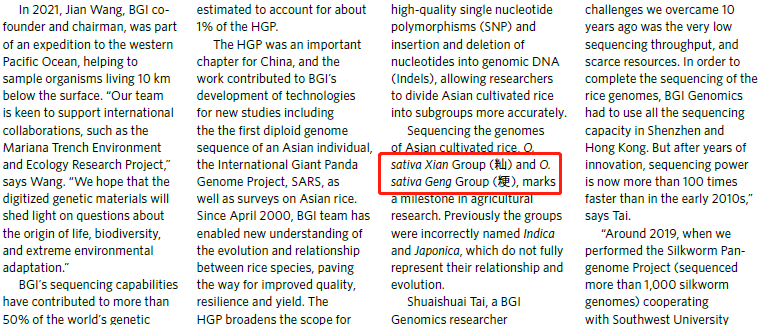
又到了每周一次的Nature Podcast时间了!欢迎收听本周由Benjamin Thompson和 Shamini Bundell 带来的一周科学故事,本期播客片段讨论亚洲10万人类基因组测序项目——基于亚洲人的人类遗传学研究。欢迎前往iTunes或你喜欢的其他播客平台下载完整版,随时随地收听一周科研新鲜事。

音频文本:
Interviewer: Geoff Marsh
In 2003, when the results of the Human Genome Project were reported in Nature, it heralded a new era for biology and opened up the possibility of precision medicine – therapeutics that could be tailored to an individual’s needs based on their particular genetics. Since then, hundreds of thousands of genomes have been sequenced, and big data holds great promise for therapeutics, but up until now, this data has been most useful for a fraction of the world’s population. Here’s Nature’s editor in chief, Magdalena Skipper.
Interviewee: Magdalena Skipper
Traditionally, the focus was very much on individuals of European descent, and in fact, there were studies – one of them published in our pages about three years ago – which estimated that as recently as indeed three years ago, 80% of genetic studies and whole genome sequencing was still done in individuals of European descent.
Interviewer: Geoff Marsh
Considering that less than 10% of the global population is European, it’s clear that these proportions represented in our genomic libraries are out of balance, but it’s not just an issue of equality. Andrew Peterson is one of the researchers on the GenomeAsia 100K Project, which is part of an effort to redress this balance. I called him up to ask why only studying a small proportion of the human population is bad for science and medicine.
Interviewee: Andrew Peterson
There’s two very obvious areas that we miss out on by not focusing on different populations when we carry out genetics studies. So, our ability to predict for an individual their genetic risk for disease is based on a large number of studies that are done in the same population group. On the other side, all of humanity loses out when we don’t carry out genetic studies in other population groups because the biology of disease that we understand from one population can be particularly unique and illuminating but it applies to all of humanity.
Interviewer: Geoff Marsh
And that’s because while great variation exists between different groups of people – we’re all clearly very different – the underlying code of our DNA is the same. By sequencing diverse groups of people, certain associations between genes and traits may be more obvious in particular populations, but those results will apply across the board. As the name implies, GenomeAsia 100K has the lofty aim of sequencing 100,000 genomes from Asian people. This week, they’ve published their pilot study. Now, at the moment, this has included less than 2,000 people, so it hasn’t tipped the scales just yet. But those nearly 2,000 genomes represented 64 countries across Asia and they’re already reshaping our understanding of the sheer diversity present in Asia. Here’s the scientific director of the project, Stephan Schuster.
Interviewee: Stephan Schuster
The big discovery that has been made is that before the start of the project, people thought of Asia more or less as an extension of the European genetic diversity, very different from Africa, but not distinctly different from European. What we now show is that there is an unprecedented amount of diversity that is truly unexpected, and the best way to describe it is that if you think of all the Europeans and their descendants in the different parts of the world make a little less then 1 billion people, they all go back to a single ancestral lineage. If you take the same level of resolution, you would get ten or more lineages for Asia.
Interviewer: Geoff Marsh
This huge amount of variation holds great promise for our understanding of disease, and the results of this pilot study suggest that the reason for all this variation is Asia’s high number of so-called founder populations. Here’s Andrew Peterson again to explain what we mean by these founder populations.
Interviewee: Andrew Peterson
Iceland is one of the easiest to describe because Iceland was founded by a few couples and they then expanded to fill the whole island. That’s very useful because something that was a rare variant in the general population now becomes common. That’s essentially what the founder effect is. So, we know about Iceland and a company called deCODE has been very successful at studying genetic bases of disease by using that founder effect, but what we discovered was although that seems to be a somewhat unusual characteristic in European populations, there are thousands of founder populations in Asian populations.
Interviewer: Geoff Marsh
Is that just because of the sort of dotted island nature of the region?
Interviewee: Andrew Peterson
It is in Indonesia. In South Asia, there are no geographic barriers and really the barriers are cultural barriers so, in other words, strong cultural barriers to marrying outside of the groups that cultural patterns dictate that you marry in, so marrying within your own group. So, it’s very interesting in terms of how cultures and societies and how humans interact, but it’s very, very useful for understanding the biology of disease.
Interviewer: Geoff Marsh
Whilst these results sound promising for our basic science understanding of disease, I wondered whether it would be prohibitively expensive, in developing countries for example, for people to use this information for personalised medicine.
Interviewee: Stephan Schuster
I would say no, and see, this is the other thing that I am feeling very, very positive about because in the developed world, it is always about the patient or the wealth of the healthcare system that the person is associated with, but if we, for example, can make this distinction, that this ethnic group has this high allele frequency for certain variants, you can give recommendations back to all the doctors who are practicing in that area and say, you need to be aware of this adverse effect and also watch out for other things. So, in the end, you don’t need to have every single person sequenced.
Interviewer: Geoff Marsh
Understanding the unique variation within a particular group of people has clear benefits for the members of that population. This pilot study represents a positive step towards expanding our genomic data beyond the borders of Europe, but the effort is far from finished. Here’s Nature’s editor in chief, Magdalena Skipper.
Interviewee: Magdalena Skipper
As wonderful as it is to see this study, and it’s really important and the whole project, I would love to see greater attention paid to similar studies focused on populations in Africa and on individuals of African descent who live elsewhere. These populations are some of the most genetically understudied populations. Those individuals deserve to have those genetic associations surfaced and studied, and also, of course, because we all came from Africa, there is the greatest genetic diversity and amount of genetic variation present in Africa, and we still have not tapped into that.
Interviewer: Geoff Marsh
Do you think these kinds of projects are going to start happening now?
Interviewee: Magdalena Skipper
Oh, definitely, and a number of projects focusing on Africa are taking place already. One that comes to mind immediately is H3 Africa, which is largely funded by the NIH and the Wellcome, but of course there are many others.
Host: Benjamin Thompson
That was Nature’s editor in chief Magdalena Skipper. You also heard from Andrew Peterson and Stephan Schuster, who are both members of the GenomeAsia 100K consortium. You can read their paper over at nature.com.
Nature Podcast每周为您带来科学世界的全球新闻故事,覆盖众多科研领域,重点讲述Nature期刊上激动人心的研究故事。我们将话筒递给研究背后的科学家,呈现来自Nature记者和编辑的深度分析。在2017年,来自中国的收听和下载超过50万次,居全球第二。
↓↓iPhone用户长按二维码进入iTunes订阅
↓↓安卓用户长按二维码进入推荐平台acast订阅
限 时 特 惠: 本站每日持续更新海量各大内部创业教程,一年会员只需98元,全站资源免费下载 点击查看详情
站 长 微 信: lzxmw777






